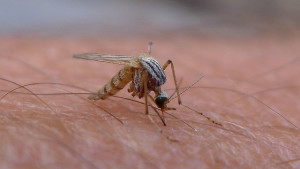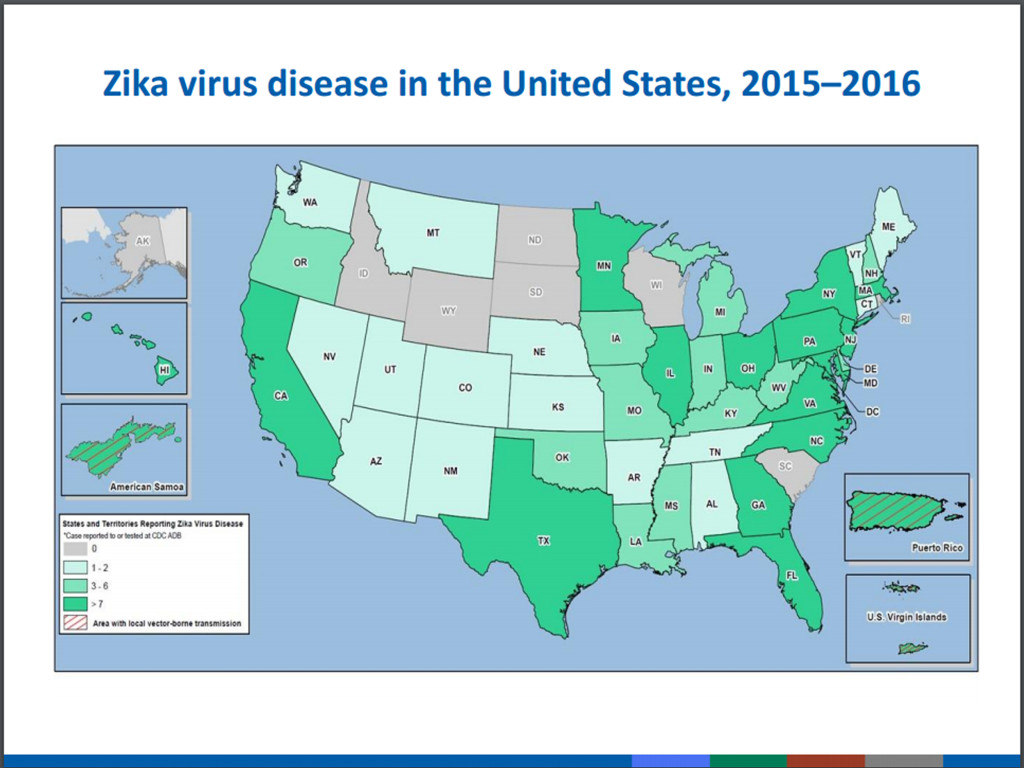Zika transmission by Mosquitos reported in Florida – Arizona is next
Fourteen people in Miami area have been confirmed to have Zika transmitted by mosquitos. The danger is not that the mosquitos will travel, but as people travel and mosquitos bite them it is confirmed that those mosquitos will become vectors for transmission. Arizona has the mosquito that transmits this virus.
The point of the news release is not surprising, but predicted – much like it is predicted that this virus will spread rapidly throughout the southern United States. See below about what you can do to protect yourself.
As of July 27 there have been over 1600 cases of Zika in the United States – that does not include Puerto Rico. Puerto Rico, as of July 7, at least 5,582 people had been diagnosed with the virus there, including 672 pregnant women.
Some are predicting that Zika will not be as bad as it has been in South America, as more Americans stay indoors during hot weather where we have air conditioning. Still, the rapid growth of mosquito born Zika in the Miami area is worrisome.
Pediatricians and Family Doctors Need To Prepare for Zika
A new report suggests that pediatricians need to learn from the HIV/AIDS epidemic as a model for how to take care of children and address the projected effect of the Zika virus on neurologic and developmental outcomes.
The Zika Virus has undergone mutations in its gene that make it more favorable to replicate in developmental brain cells in the fetus.
Factors that have led to the emergence of the virus include the mosquito concentration (Aedes aegypti) along with urban crowding and poverty. These conditions are replicated in Arizona, as well as Texas, Louisiana, and Florida.
By the end of 2016 and start of 2017 over 1 million pregnancies are at risk in the US. Pediatricians need to be prepared for the rise of microcephaly as well as less visible neurologic and cognitive outcomes. Besides the obvious microcephaly, Zika infection can lead to much more neurologic dysfunction on a much wider scale.
Can the Zika Virus come to Arizona? It is already be here!
 The first confirmed Zika infected patient has been identified in Arizona, and the mosquito that carries the virus and spreads the virus, Aedes mosquito that has been found in Maricopa County. The mosquito that is not only responsible for spreading Zika, but also Dengue fever, Chikungunya, West Nile virus, and yellow fever (all of these are of the same virus family called flavivirus).
The first confirmed Zika infected patient has been identified in Arizona, and the mosquito that carries the virus and spreads the virus, Aedes mosquito that has been found in Maricopa County. The mosquito that is not only responsible for spreading Zika, but also Dengue fever, Chikungunya, West Nile virus, and yellow fever (all of these are of the same virus family called flavivirus).
What has become more disturbing is that Zika has now been fostered in the native mosquitos of Arizona.
The first case of Aedes mosquito transmitting disease happened in Texas in May 2016.
The significance is that the woman infected with Zika traveled to an infected area and is now back in Phoenix. Mosquito season has started in Phoenix and as people come back from South America or Central America and they bring back the bug it can be picked up by those mosquitos and transmitted to others.
When the year began with the CDC issuing travel warnings to the Caribbean after a confirmed Zika virus infection from the territory of Puerto Rico. As of today major US airlines announced it will refund tickets to areas affected by Zika or allow people to postpone trips.
Isn’t it odd that the Olympics are still being scheduled in a highly infected area?
Here is what we know:
Birth Defects
The Zika virus, associated with a birth defect called microcephaly which is characterized by an abnormally small head and incomplete brain development, followed by infant vision and hearing loss. In addition to the obvious microcephaly, there are other less visible defects that will affect neurologic development and cognitive outcomes. We know that Zika virus causes the birth defect because of a mutation that allows replication of the virus in cells that are cortical neural progenitor cells that give rise to fetal brains.. The evidence was first noted with the rise in microcephaly in Brazil that occurred at the same time as an epidemic of Zika infections. Brazil has had over 4000 cases of microcephaly in 2015, a 40 fold rise from the year before (146 cases in 2014).
Transmission
Zika virus can infect a fetus, which is not seen in the other flavivirus. While transmission and pandemics occur through mosquito bites the virus has been transmitted during labor, blood transfusion, and sexual contact. So while men may travel to South America, they can still infect their partners with Zika virus for weeks after they return.
Typical Viral Symptoms
Zika virus infection is typically mild – fever, rash, joint pain, and red eyes. But a small percentage of people infected with Zika virus can develop Guillain-Barre syndrome – a disease that starts as weakness and tingling in the feet and legs that will spread and can result in paralysis.In most cases, there are no symptoms. In a few cases, Zika can trigger paralysis (Guillain-Barré Syndrome). In pregnant women, it may cause subsequent birth defects.
When present, symptoms are mild and last less than a week. They include fever, rash, joint pain, and red eyes.
There’s no vaccine or specific treatment. Instead the focus is on relieving symptoms and includes rest, rehydration, and acetaminophen for fever and pain. Aspirin and non-steroidal anti-inflammatory drugs (NSAIDs) like ibuprofen should be avoided.
Treatment Of The Virus
There is no specific anti-viral medication for the virus. There is no vaccine against Zika, although the virus is closely related to Dengue fever and this virus will be tested. Currently treatment is just for symptoms.
Where Is Zika Now, And Where Can It Go

from Brookings.edu
Only the coldest states in the US are protected against this mosquito, the warm humid states will be the first noted. Alaska once was considered inhospitable climate for the mosquito type that carries the virus. Now that the virus has been found in North American mosquitos that means Zika is a problem. Currently over 60% of the population of the United States is at risk for the virus. Thus far the only states not reporting this virus include Wyoming, Idaho, Montana, and Alaska.
Since Maricopa County has found this mosquito the odds are that it will become a worse problem in Arizona by this summer.
Zika Is Not The Worst
Of the flavivirus Zika is not the worst from a public health perspective. Dengue fever and yellow fever have far more potential for death than Zika. Those viruses can all be carried by the mosquito that is arriving to the United States.
What Can You Do to Protect Yourself
Avoid travel to the infected areas.
Consider putting off a family for the next couple of years.
But best to avoid mosquitos – and we have the best tips in our blog Mosquito Repellents that Work.
GMO mosquitos have been tested and were successful in eliminating 92% of the virus. The female mosquito bites humans, but it only mates once. By mating the mosquito with a genetically modified male results in a non viable egg. The mosquito has been tested in multiple places.
Until then- avoid standing water, be vigilant about pools and if you are pregnant or planning to become pregnant avoid infected areas and mosquitos.
Finally – toss your coffee grounds into areas of standing water – because it inhibits mosquitos from hatching – see Coffee Grounds Inhibiting Zika.
REFERENCES:
Hotez, PJ. What does Zika virus mean for the children of the Americas? JAMA Pediatrics. 2016 20 Jun. [Epub ahead of print]. doi: 10.1001/jamapediatrics.2016.1465.
